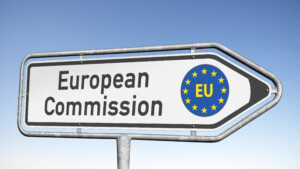 Yesterday (30 November), the European Commission adopted the first parts of its long-awaited proposal for the second Circular Economy Package including a policy framework for biobased, biodegradable and compostable plastics as well as a proposal for a new Packaging and Packaging Waste Regulation (PPWR). European Bioplastics (EUBP) welcomes the included new rules on packaging and bioplastics. The industry appreciates the Commission’s first comprehensive policy framework on innovative bioplastic materials as it acknowledges their potential to provide genuine environmental benefits. “EUBP in particular commends the Commission’s endorsement of the important role of compostable plastic packaging in the proposed packaging rules in reaching the ambitious waste and climate targets. However, we would have expected stronger support for the use of biobased feedstock” commented Hasso von Pogrell, Managing Director of EUBP, right after Vice President Timmermans and Commissioner Sinkevičius presented the proposal during a press conference on Wednesday afternoon in Brussels.
Yesterday (30 November), the European Commission adopted the first parts of its long-awaited proposal for the second Circular Economy Package including a policy framework for biobased, biodegradable and compostable plastics as well as a proposal for a new Packaging and Packaging Waste Regulation (PPWR). European Bioplastics (EUBP) welcomes the included new rules on packaging and bioplastics. The industry appreciates the Commission’s first comprehensive policy framework on innovative bioplastic materials as it acknowledges their potential to provide genuine environmental benefits. “EUBP in particular commends the Commission’s endorsement of the important role of compostable plastic packaging in the proposed packaging rules in reaching the ambitious waste and climate targets. However, we would have expected stronger support for the use of biobased feedstock” commented Hasso von Pogrell, Managing Director of EUBP, right after Vice President Timmermans and Commissioner Sinkevičius presented the proposal during a press conference on Wednesday afternoon in Brussels.
The bioplastic industry is especially relieved to see that an initially proposed partial ban on compostable plastic packaging was eventually lifted and compostable packaging solutions will continue to be allowed to be marketed and recycled in the EU. The PPWR proposal recognises the contributions of compostable plastics in increasing the volumes and quality of separately collected biowaste and reducing the contamination of (organic) waste streams. By making several packaging applications mandatory to be compostable in industrial composting facilities, including tea bags, filter coffee pods and pads, fruit stickers, and very lightweight plastic carrier bags, it is taking a first step in the right direction.
However, the proposals also led to criticism from the bioplastics industry: “Unfortunately, a few persistent misconceptions remain in the Communication on the policy framework for biobased, biodegradable and compostable plastics with regards to land-use, the methods used to evaluate environmental benefits, alleged risks of cross-contamination of waste streams, as well as biodegradability in different environments,” said von Pogrell. All these misconceptions have prevented the Commission from fully embracing the shift to biobased products that would enable Europe to reduce its dependency on fossil resources and achieve its ambitious climate and circularity goals.
Hence, the proposal for new packaging rules still needs improvement. Notably, the PPWR falls short on promoting biobased content equally to recycled content through targets. This would help to secure feedstock availability, to achieve recycled content targets, and to meet the strict requirements for contact-sensitive materials. Prioritising recycled content and mechanical recycling, according to the industry, will not be enough to replace the EU’s dependence on fossil resources and to stop the current trend of over-packaging and excessive waste in the EU.
“We call on EU policymakers to show more ambition and clear vision in their political support to biobased and compostable plastics by improving and further clarifying the proposal with the aim to decisively support innovation in the sector of sustainable materials and packaging solutions, ensuring that investments, jobs, and innovation remain in Europe”, said von Pogrell with regards to the upcoming ordinary legislative procedure.
EUBP will continue to provide evidence and expertise in order to make sure that the potential and benefits of bioplastics in the transition to a climate-neutral circular economy are being fully acknowledged.
Please also read the related EUBP press release on the PPWR and policy framework (also available in French and German) that was published on 30 November.